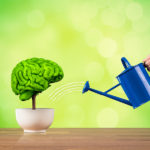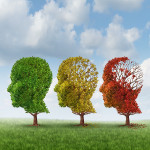By David Blyweiss, M.D., Advanced Natural Wellness
January 27, 2017
- Can’t stay focused?
- Foods that boost focus and concentration
- 3 more foods to banish brain fog
Don’t you just hate it when you’re trying to do something and just can’t stay focused on it? Your mind wants to go everywhere except where YOU want it to go.
And then you have those weird moments where you can’t remember a name, address or phone number… even though they normally come naturally to you. They’re as familiar to you as your own face.
Well, this is something that happens to all of us on occasion. But it doesn’t necessarily mean you’re experiencing serious memory problems. Instead, you could be putting the wrong foods in your mouth.
That’s right. What you ate for breakfast, lunch or dinner – not to mention all of those between-meal snacks – could be affecting the way your brain thinks.
So today let’s take a look at the foods that disrupt your brain power, and those that can keep you sharp as a tack all day long.
MD Exposes the Hidden Danger to Your Eyes

When your eyesight starts to fail, it's a real problem. Suddenly you can't go to the grocery store... you can't get to the doctor if you have an emergency... you can't meet your friends for dinner…
Your "regular" doctor doesn't have time to keep up with the latest research. And the same goes for eye doctors. They go to school to learn how to fit you for glasses and contacts, but have no way of preventing the damage and loss of eyesight that threatens your freedom and independence.
Let me show you something that explains a LOT about how your eyes work.
In my FREE Special Report, I'll show you a HUGE, untapped resource for your eyes that safely and naturally restores clear, effortless eyesight.
Click here to get started...
Foods that Boost Focus and Concentration
If you’re eating your highest protein meal at the end of the day, your daytime mental acuity may be suffering for it. That’s because your brain needs amino acids from protein to keep your brain active and thinking throughout the day.
Instead, start your day with a protein rich breakfast that includes a few plant-based carbohydrates. This will help prevent sugar highs and lows that can leave you feeling tired and out-of-focus later in the day.
There are plenty of healthy sources of protein, including pastured eggs, kefir or plain Greek yogurt, pasture-raised poultry, beans, sesame and pumpkin seeds, and grass-fed beef.
And what about fats? Well, if you’re eating a low-fat diet in the name of good health, it could be destroying your focus. Just like protein, your brain needs essential fatty acids to keep it thinking clearly.
To avoid a mid-afternoon brain meltdown, lunch is a great time to feed your brain some of the healthy fats it craves. Dark leafy green vegetables, nuts, beans, avocado, extra virgin olive oil and wild-caught fish all contain healthy fats that can boost your brainpower.
It’s also important to note that high glycemic carbohydrates, packaged foods and ones that are sugary are the worst offenders when it comes to after-lunch brain fog. These foods will allow send your blood sugar sky high. Then, when it plummets, you’ll barely be able to keep your head up, let alone think.
Three Quick Fixes for Brain Fog
Are You Suffering From...
- Love handles and a pot belly
- Romance that isn't what it used to
- Forgetfulness and inattention
- Low (or no) strength and endurance
- A sex drive that's shifted into neutral...or worse
If so...you may have Mature Male Burnout. Click here to discover more about this unique condition and what you can do about it.
Now, nobody eats perfect all of the time. There will be days when you grab a bagel for breakfast, enjoy a few slices of pizza for lunch, or skip a meal or two altogether.
If you find your attention, focus and concentration suffering on these days, there are a few quick tricks you can use to snap your brain back to its normal alert state.
On days when I don’t have time for lunch, one of my “go-to” foods is blueberries. I generally keep them on hand for a quick pick-me-up that I can munch on quickly between patients.
These little berries are rich in antioxidants that stimulate the flow of blood and oxygen to the brain. This helps keep your mind fresh and active. In fact, a mid-morning smoothie containing 200 grams of blueberries could potentially boost your performance and concentration for five hours or more.
Caffeine is another quick fix when your brain starts misfiring. But coffee and energy drinks aren’t the answer. In fact, if you drink too much of these beverages during the day, they can actually lead to a monumental brain crash.
So it’s a good idea to limit your intake of these beverages. I recommend only a cup or two of coffee each morning. And it’s a good idea to forego the energy drinks altogether, as there have been a lot of negative reports about them.
Instead, opt for a cup of tea to give your brain a mid-day boost. When it comes to improving your attention, it outperforms coffee on every level, even though it contains less caffeine. This may have something to do with the abundance of antioxidants – specifically the polyphenols – that are found in tea.
And here’s a big surprise for you.
If you suddenly have a craving for chocolate right around the time your focus seems to short-circuit, your brain may be pointing you in the right direction. But hitting up the vending machine for a Hershey’s or Nestles milk chocolate bar isn’t the answer.
Instead, a high quality dark chocolate that contains about 70% cacao will provide the most stimulation to your brain. It contains phenylethylamine, a chemical we naturally produce when we’re excited. Another compound in dark chocolate, theobromine, has an effect that’s similar to caffeine.
However, don’t start binging on chocolate every day. Stick to no more than 3.5 ounces a week.
SOURCES:
University of Reading. British Science Festival addressed by Drs Spencer and Wagstaff. Food and Nutritional Sciences. 2009;16(1).
Einöther SJ, et al. Acute effects of tea consumption on attention and mood. Am J Clin Nutr. 2013 Dec;98(6 Suppl):1700S-1708S.
Montopoli M, et al. The Acute Electrocortical and Blood Pressure Effects of Chocolate.
NeuroRegulation. 2015 Apr; 2(1):3-28.







